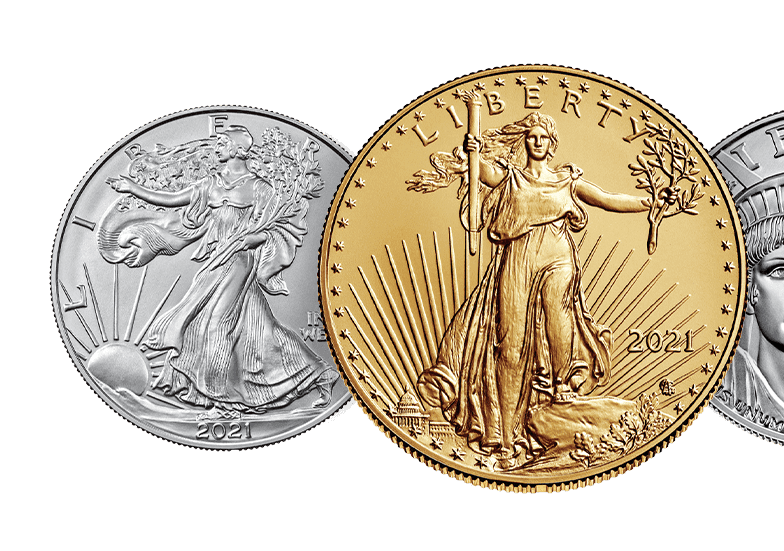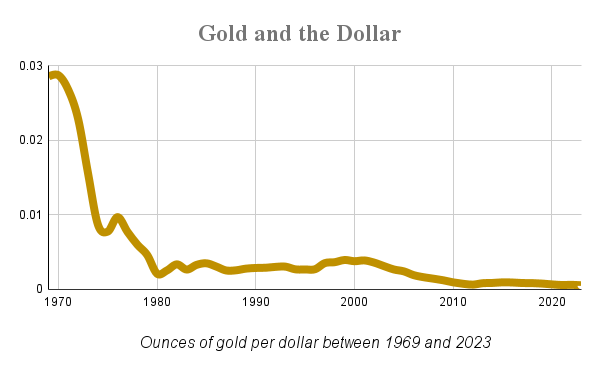Our $34 Trillion Debt Is Turning the States to Gold
Value of the dollar in classical specie plunges 13 percent in 2023 alone as the debt and monetary crises entwine.

Just as we were set to mark our national debt crossing $34 trillion the Mises Institute sends a note steering its fans to the Sound Money Index, ranking the states by the degree to which they provide an environment for honest money. The index, produced by the Sound Money Defense League and Money Metals Exchange, records that the classical monetary metals, gold and silver, discover the value of fiat currencies like the dollar, not the other way around.
“Gold and silver are money,” the index notes, “not by government decree, but because they have proven to be over the test of time, by maintaining their value.” That insight is underscored, as the 2024 index is released, by the fact that the fiat dollar is flirting with an all-time low versus gold. On the last trading day of 2023, the Wall Street Journal observes, the dollar fetched in futures markets but a 2,062nd of an ounce of gold — a fall for the year of 13 percent.
Over the long run the dollar’s collapse has been even more precipitous. It’s been a downhill plunge since President Nixon in 1971 severed the greenback’s last link to the gold standard. He abrogated America’s pledge under the Bretton Woods agreement to redeem dollars presented to it by foreign governments at the rate of a 35th of an ounce of gold. The adjacent chart depicts the catastrophe, in which the dollar has lost more than 98 percent in gold.

Federal policy is largely to blame for the dollar’s debasement, the Sound Money Defense League says. Yet “there are practical steps that can be taken at the state level to promote the use and acceptance of sound money,” it adds. One key is eliminating taxes on the monetary metals. Such taxes, the league’s policy director, Jp Cortez, tells us, create “friction,” disrupting the flow “into and out of the US dollar,” as well as in and out of gold and silver.
Under a specie standard, paper money is convertible into gold, silver, or both at a fixed legal rate. With fiat money, taxes impede exchanges of paper dollars and monetary metals. Feature how excise taxes are levied when dollars are traded for gold or silver, or when capital gains taxes are imposed on monetary metals. By ending such taxes, Mr. Cortez says, “states will have removed the strongest impediment to people readopting gold and silver as money.”
The league’s top priority is ending these taxes. So far, “43 states have ended the sales tax on gold and silver,” Mr. Cortez says, and “of the 7 that remain, 5 of them have active legislation to end” the taxes that currently stifle what he calls “the purchase of sound money.” That includes, Mr. Cortez says, a bill now moving through the New Jersey legislature with “unanimous passage” in the state Assembly and a Senate committee.
The league’s index names Wyoming as the best state in the nation for sound money policies, with South Dakota, Alaska, New Hampshire, and Arkansas rounding out the top five. To create the rankings, the league weighs each state’s tax policies relating to monetary metals. The league also considers questions like whether a state has a bullion depository and whether state reserves or pension funds include any holdings of gold or silver.
The league also urges the states to take the course “envisioned by the Founding Fathers” by “acknowledging gold and silver as real (not to mention constitutional) money.” So far Arkansas, Oklahoma, Utah, and Wyoming have enacted laws, foreseen in Article I, Section 10 of the Constitution, to make “gold and silver coin a tender in payment of debts.” Congress’s failure to maintain the dollar’s value is giving the states an opportunity to lead the way back to honest money.

